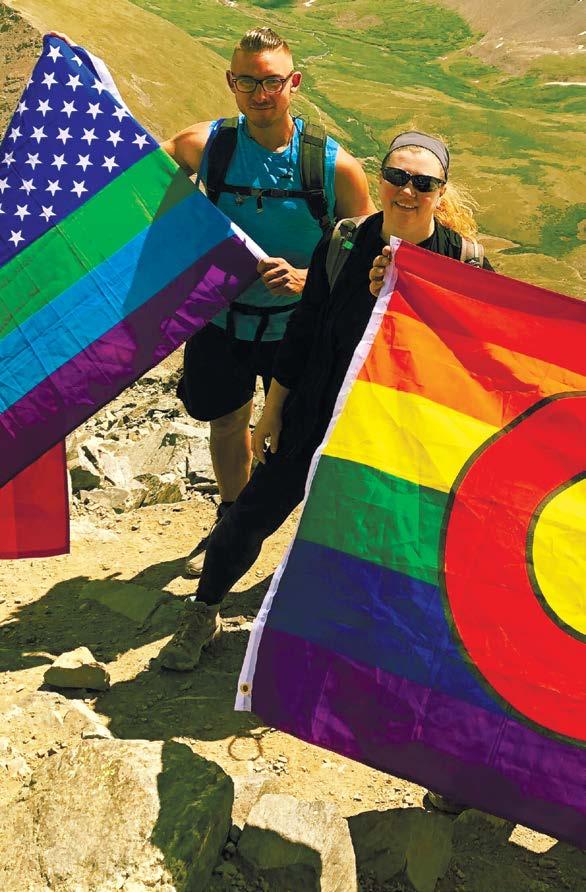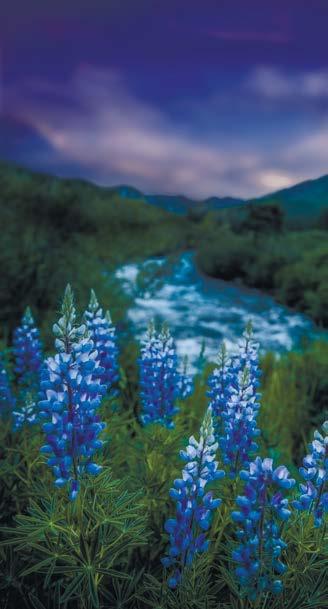
4 minute read
THE MOUNTAINS HOLD NOJUDGEMENT
The Mountains Hold No Judgement
by Eliza Beth Whittington Photo by Molly McCormick
Here’s a familiar narrative—rural/ suburban-raised queer comes out, at least to themselves, in a religiously oppressed household. They flee to the nearest city and find themselves breathless with wonder and lust, starry-eyed in bitchy, bohemian bars and pulsing nightclubs. Surrounded at last by ‘their people,’ they begin the process of finding themselves in others and licking the gaping, salted scars of familial rejection in an urban enclave of like-minded hotties.
We all saw that 90s movie, played by cis, straight actors, right? Some of us have been so lucky as to have the experience of moving from oppressive homes and into the protective arms of queer family. What queer can imagine moving from the safety of their urban enclave without a support system or dating prospects? Few, to be sure. But, how would we know? When, time and again, the narratives we are given from popular culture paint queerness as something that happens on catwalks and in vapid crowds of drug-addled and sex-crazed deviants?
Leaf through Whitman’s Leaves of Grass, and without much imagination, one can sense the fullness of his existence, the depth of his self-love, sexuality, and tenderness. One can almost smell the pleasant musk of manhood, the wet leather and wet grass emanating from him.
Why, then, does it feel so foreign to see queerness represented in the great outdoors, when, as Whitman suggests, it is such a vital aspect of life for us? There is substantial evidence of the restorative effects of natural settings and scenery associated with a reduction of psychological distress, depressive symptoms, and that those with mental health disorders exposed to natural, not built, environments report higher levels of positive feelings.
Considering that LGBTQ folks are 2.5 times more likely to experience depression and anxiety that the average population, according to a Kaiser Family Foundation study, and that 30.8 percent of transgender individuals have seriously considered suicide, (compared to the heterosexual individuals at 2.3 percent) according to a 2009 Massachussets Public Health Department Study. We, of all people, should be abiding in the wilderness the most.
As a young queer growing up in the mountains of Colorado, I’d seek solace from the noise of middle and high school and my family of seven on the mountainside. At this point of my life, the idea of not knowing any “out” queers seems impossible, but at that point, it was true. My journal and the mountains were the confidants of my confusion, confessions, angst, and dread. In my human health class and Christian after-school program, we were given the narrative of straight as “natural” and queer as “unnatural,” so it was easy to feel othered, less than, and alone. In the mountains, the solitude felt comforting rather than confining. I ambled along Clear Creek and let my thoughts flow downstream. In the mountains, all the nonsense disappears. When ascending an alpine forest, it is possible to drink in the beauty and reassurance of a forest, the thick, pineneedle floor, the chitter of squirrels and call of birds, the trickle of a snowmelt creek, the way our gaze scans geologic time as we take in beauty of layers of rock on a ciiffside ... each layer an age, a climate, an eon. Miniscule things like who you are attracted to and how you express your gender seem laughable in this sort of timeline; the trees do not judge you for whose hand you hold beneath their branches; the snowmelt creeks do not define or presume your gender as it runs over your glistening skin;the wildflowers blush pink no matter who you moan with.
I was given the task of writing about the intersection of queerness and mountains … but what I see, what I feel, in regard to these two towering pieces of my life, is not an intersection as much as an ecosystem, parts of a whole. Nature transcends human definition. We can categorize its parts and pieces, identify its plants and animals, its rainbow trout and riparian streams, gasp at its autumnal leaves, and the mountains, remain indifferent.
The mountains will support life, whether or not you understand it. The mountains will accept your grief whether it is for a loved one, an unaccepting family member, or deadname. You can bury your shame, trinkets, or formaldehyde-soaked breasts, and a hungry predator will find its way to dig them up. The hot springs will warm and soothe your body, despite your dysphoria, every time.
I know I’m not the only queer who feels more comfortable on a mountainside than in a dance club. My hope is that we are slowly changing the narrative of what queerness looks like and where it occurs. I hope we continue to fight, not only for Black, trans, immigrant, and Indigenous lives, but for the systems that support all of us.








